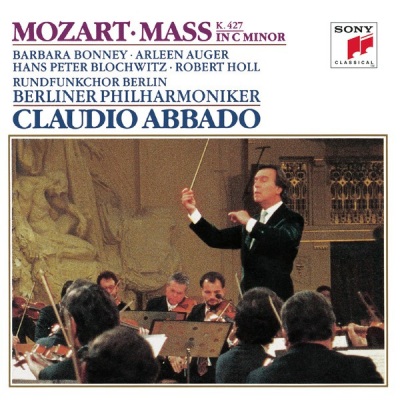
Mozart: Mass In C Minor, K. 427 (417a)
Abbado’s performance is wide-ranging, delivering most satisfyingly in every aspect. He has an impressively unified team at his disposal, with Bonney and Auger as well matched as one could hope for. It is one music’s many tragedies that Mozart left unfinished both of his two grandest and greatest choral pieces – the Requiem in D minor, K626, and this Mass in C minor, K427. Of course we know why in the case of the former: but we’re not so sure in the case of the latter. It was written soon after falling out with the Archbishop of Salzburg (and so, inevitably, with his father) and falling in love with (and marrying) Constanze Weber. Mozart – newly settled in Vienna, without a regular income – would have been easily distracted from finishing a score which (as an act of thanksgiving to God, or perhaps a reconciliatory offering to his father) was unlikely to be a big earner for him. I have often wondered whether history’s verdict on the C minor Mass was in fact secretly shared by its composer. Namely that, containing as it does a quite extraordinary diversity of music, the whole never quite manages to add up to the sum of its parts. Don’t misunderstand me: the score includes some of Mozart’s most wonderful music, and there isn’t a weak moment from beginning to end. But consider the range of music on offer here! The piece embraces Masonic solemnity (the dark opening chorus, with its forbidding trombones and soulful soprano solo); a childlike operatic happiness (the aria Laudamus Te, sung divinely in this recording by Barbara Bonney); immaculately ornate concerto-like ensembles such as the soprano-flute-oboe-bassoon quartet, Et incarnatus est; a massive chaconne of frightening severity on a descending (Dido-like) chromatic bass – the Qui Tollis; the majestic baroque antiphony of the bi-choral Hosannas; and the truly archaic academic counterpoint of Cum Sancto Spiritu. No wonder, you might say, that Mozart seemed unsure of how to pick up the pieces once he’d lost the impetus. Abbado’s performance is wide-ranging, delivering most satisfyingly on every aspect of this hugely varied score. He has an impressively unified team at his disposal, with a superb quartet of singers: in fact Bonney and Auger are as well matched as you could reasonably expect to find in the impossibly demanding Domine Deus duet. The Berlin Radio Choir are a smallish, professional group, and are partnered by (or so it sounds to me) a chamber-sized Berlin Philharmonic. So there’s a lot of detail to be heard: those racing semiquavers in the trombones (in the Gloria in Excelsis) or oboes (the Credo) are not drowned – as often they are – by an overlarge chorus. Nothing is overlooked, and nothing is overstated. -- Peter J. Lawson, MusicWeb International reviewing this performance reissued as Sony 89777 in Europe
